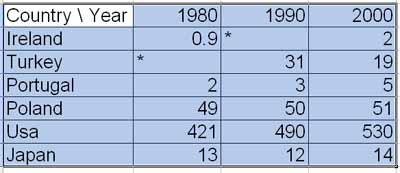IELTS exam in Egypt – January 2009 (Academic Module)
Tara is sharing her IELTS experience of the Academic module in Egypt. Amazingly, she even managed to remember the table in Writing task 1! Many thanks to Tara, and here is the update:
Reading test
The reading test was very hard, not only for me but also for the other candidates.
Writing test
Writing task 1(report)
The table below shows the amount of waste produced in the period between 1980 and 2000 in six different countries.

Table indicates the amounts of waste per year (in millions of tonnes)
Write a report in which you describe this table.
1) * means unavailable data ( this note has been written in the test paper )
2) Names of countries are correct, but the numbers are not exact, yet very close to the exam and show the same trends.
Writing task 2 (essay)
Some people argue that hard work and determination are the most important factors in success, others see that there are other factors that are more significant. discuss both views and give your opinion.
Speaking test
Interview
– Where are you from?
– How so you enjoy your life in your home town?
– What about the tourists who come to your country?
– What preparations do you go through when visitors come to your home?
– Are sports popular in your country?
– Where can people swim in your home town?
Cue card
Describe a sports event that you watched or took part in.
Discussion
– What are the advantages of sports in schools?
– What are the pros and cons of giving rewards for students in class?
– What are your suggestions for countries to cooperate?

